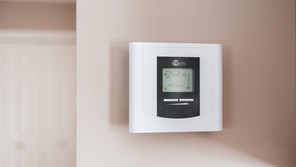How to prepare your home for winter
8 minute read

When the nights begin closing in and the weather starts growing colder, it's worth taking a moment to learn how to winter proof your house. Here are some top maintenance tips to consider for those colder months

Get Home Insurance
Age Co helps homeowners over 50 find the right protection. We are 100% owned by Age UK and our profits go back to the charity.
In this article, we’ll look at ways to combat cold and wet weather. And, just in case, we’ll also touch on how the right Home Insurance can provide additional peace of mind.
Bleed your radiators*
Over time, air bubbles can gather in your radiator. The trapped air prevents the radiator from filling with water fully, which means it won’t heat your home as efficiently and can lead to higher energy bills.
If the top of your radiator is much cooler than the bottom, then it may need bleeding. You can bleed your radiators easily yourself; all you need is a radiator key.
How to bleed a radiator
- Turn your heating off
- Have a cloth or towel at hand to catch any water
- Insert your radiator into the bleed valve
- Turn the key anti-clockwise until you hear a hissing noise
- Close the value once the water starts to leak out
- Twist the key clockwise and make sure it's nice and tight
For further guidance on safely bleeding a radiator, see this helpful video.
Finding the right temperature for your radiators
You might also wonder what temperature should radiators be in winter. There’s no magic number. For most people, the most comfortable temperature tends to be between 18°C and 21°C. However, radiators alone don’t always allow for a precise room temperature to be set. Modern radiators values are often numbered 1-5, with the lowest setting (1) roughly equating to 10°C and the hottest (5) to 30°C.
The size of the room and insulation will affect which radiator setting is needed to reach an ideal room temperature. You may also need to make adjustments to your radiator settings throughout the day to stop your home becoming too hot or too cold.
Using a smart thermostat to monitor the temperature of the room and control the radiator settings can an energy-efficient way of reaching the best room temperature – more on this below.
Clear drains and guttering*
If you don’t clean a blocked gutter or drain, fallen leaves and debris can build up and weigh it down, causing cracks and with a heavy winter downpour could create a flood risk. That’s why it’s important to do a clear out before the cold and frosty weather sets in.
Important: always exercise caution when inspecting or cleaning your gutters yourself. Only attempt this task if you feel able and can safely access the area.
How to clear a gutter
- Set a ladder up in a safe position, ideally following the 4:1 rule, whereby your ladder is 1ft away from the wall for every 4ft of height it has. If possible, make sure it doesn’t lean directly on your gutters. You may need a ladder stay if your gutters are on a second story or higher.
- Start by clearing debris with your hands, use gardening gloves to protect your skin and attach a bucket to your ladder for easy disposal as you scope out what you can.
- Flush gutters with water, once the bulk of the blockage has been removed, you can use a hose to rinse away the rest of the debris.
Once clean, you might consider investing in gutter guards to help limit the build up of debris in future. Trimming branches from nearby trees can also help minimise the problem and will also help prevent damage to your home during stormy weather.
How else can I prepare my house for winter outside?
As the weather grows colder, it’s also important to ensure items such as lawnmowers, garden furniture, barbeques and bicycles are safely stored away in a garage or shed to prevent damage or theft during the winter months.
Insulate your windows
Knowing how to seal windows for winter can be a cost-effective way to keep energy bills down during the coldest months. If you believe your windows are letting heat escape, consider the below tips.
How to insulate windows
- Assess your windows: as faults in the glass or frame can be a top contributor to heat loss. If you spot any gaps or cracks, try using sealant or weather strips to prevent cool outdoor air leaking into your home.
- Upgrade your glazing: if you have single glazing, you might also consider an upgrade to double/triple glazing.
- Apply a window film: this can be one of the cheapest ways to insulate windows for winter, as films can be purchased for around £10 online or in local hardware stores. Another cost-effective alternative is bubble wrap, which could be a good option for small windows, providing you don’t mind losing visibility in the process.
- Invest in thermal curtain: thick, heavy material, such as wool or velvet, is going to provide greater insultation than thinner curtain varieties or traditional blinds.
Insulate your home*
Without proper insulation, any heat you create will easily escape from your home. By finding more ways to insulate your home, you can not only stay warm through the season, but you might also spend less on your energy bills. Below are some heating tips to consider for winter.
How to insulate your home for winter:
- Check your loft, as most heat escapes through this area. Providing you have easy access and no dampness/leaks/hazardous materials are present, you might be able to add insulation yourself. Otherwise, there are professionals who can step in to help
- See if your walls have cavities. Though cavity walls are often more effective than their single brick counterparts, sometimes this cavity can let heat escape. However, filling a cavity isn’t a DIY job and you’ll need to consult with a specialist about adding extra insulation here
- Purchase draught excluders, these can help minimise heat escaping under doors and around windows
- Insulate your water pipes to prevent them from freezing, and make yourself aware of where your stop tap is in case you need to shut off your water supply in an emergency
Invest in smart heating solutions
There’s a wide range of smart thermostats and smart meters on the market and at a variety of price points. These clever gadgets enable you to control your heating throughout the day, meaning you can schedule your heating to come on while you’re on your way home so it’s warm once you arrive. Some models use an in home display to help you manage your settings, while others even have their own app, so you can make adjustments remotely.
If you combine a smart thermostat with a Thermostatic Radiator Value (TRV) then they can also detect when you’ve left the house and can enable you to adjust the temperature of each room in your house individually. This means you don’t need to rely on switches or timers to save money on your energy bills.

Get home insurance sorted
Your home can be more vulnerable to risks such as storm and flood damage during the winter months, as well as pipes freezing and other cold related incidents. This is why it’s important to ensure you have a comprehensive home insurance policy in place.
Some policies offer ‘home emergency cover’, which means your insurer will step in and source professional help if you experience flood or storm damage. Many providers also let you add in boiler cover, so you’re protected in the event of any breakdowns.

Get Home Insurance
Age Co helps homeowners over 50 find the right protection. We are 100% owned by Age UK and our profits go back to the charity.
Schedule a boiler service
With the days and nights beginning to get darker and colder, the last thing you need is no heating or hot water. To help keep your boiler in good working order, it's recommended you get an annual boiler service. This way you know everything is running as safely and efficiently as possible.
Remember: always use a Gas Safe registered business or engineer for your service. This is especially important for those looking for a gas boiler service or have a combi model.
Stock up on winter essentials
Bouts of bad weather and power cuts can strike when you least expect it, so it’s always a good idea to be prepared by stocking up on winter essentials such as:
- Grit
- Anti-freeze
- Candles
- Batteries
It can also be worthwhile to invest in some winter wardrobe essentials, such as warm woollen jumpers, thermal base layers, and some good quality slippers (which can be particularly useful on cold, stone flooring).
Summary
If you find yourself wondering: how do I make sure my house is ready for winter? Try keeping these key points in mind:
- Before the weather turns, it can be useful to do some outdoor maintenance, such as cleaning your gutters, cutting back tree branches, and tidying away furniture that’s liable to rust or be blown over.
- Windows are a key culprit for letting hot air escape, so consider investing in some insulation solutions, such as thermal curtains, window films, or even upgrades to double or triple glazing.
- Investing in smart heating technology, such as smart thermostats, can provide greater control over the temperature of your house.
- All boilers, whether combi, gas, or electric should be serviced every 12 months, if you want to ensure top performance.
And, if all else fails, having the right home insurance can mean you get professional help if something goes wrong.

Sign up to the Age Co Newsletter
Each month, our email newsletter delivers inspiring stories, practical guides to later life, plus the latest news about Age Co and the charitable work we support.
